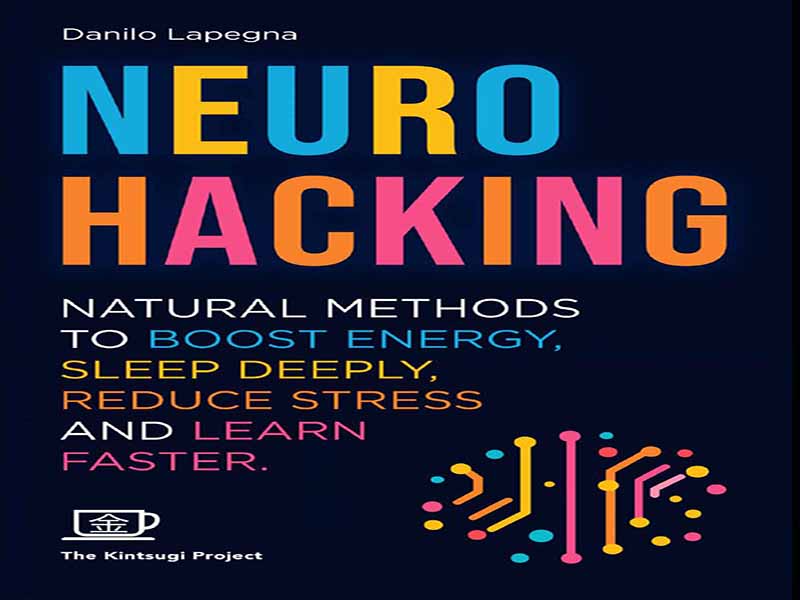- عنوان کتاب: Neurohacking – Natural methods to boost energy, sleep deeply, reduce stress and learn faster
- نویسنده/انتشارات: Danilo Lapegna
- حوزه: علوم اعصاب
- سال انتشار: 2024
- تعداد صفحه: 615
- زبان اصلی: انگلیسی
- نوع فایل: pdf
- حجم فایل: 6.54 مگابایت
بیایید حجم خود را با بررسی یک حقیقت، شاید پیش پا افتاده و در عین حال بسیار ارزشمند، آغاز کنیم: قبل از شروع هر فرآیندی برای خودبهینه سازی و بهبود، لازم است یک “ذهنیت ماجراجو”، ذهنیت یک کاشف را پرورش دهیم. ما باید به خود اجازه دهیم که نظام های اعتقادی جدیدی را اتخاذ کنیم و در صورت لزوم امکان کنار گذاشتن هر چیزی را که تا یک نقطه معین به آن باور داشته ایم باز کنیم. مسلماً، این ممکن است در ابتدا مانند لفاظی های خودیاری ساده یا ساده سازی بیش از حد مفاهیم پیچیده به نظر برسد. با این حال، همانطور که در فصلهای بعدی کاوش میکنیم، متوجه میشوید که این رویکرد کاملاً در پایههای علمی محکم ریشه دارد. این نقطه شروع در واقع نه تنها به این دلیل حیاتی می شود که ما به عنوان انسان تمایل داریم به راحتی خود را در همان روال ها به دام بیندازیم و آنها را با فرآیندهای عمدی اشتباه بگیریم (ما به چیزی اعتقاد داریم، به روش های خاصی رفتار می کنیم، اغلب به این دلیل که همیشه کارها را به همین صورت انجام داده ایم)، بلکه به این دلیل که تمایل داریم فضای مانور خود را برای ایجاد تغییرات بالقوه دست کم بگیریم. ما تمایل داریم هم توانایی واقعی خود را در تشخیص این روالها و تلاش برای رهایی از آنها و هم تأثیر مثبت عظیمی را که حاصل میشود، کم اهمیت جلوه دهیم. ما «تسلیم» بیمسئولیتی آرامشبخش روتین میشویم، با قانع شدن از وجود محدودیتهای بالاتر در واقعیت، ژنتیک یا سرنوشت. ما صرفاً به دلیل فقدان شجاعت، تخیل یا اعتقاد راسخ به اینکه کیفیت وجود ما می تواند بسیار بهتر از این باشد، از بررسی احتمالات مختلف در مورد آنچه می توانیم باشیم یا انجام دهیم صرف نظر می کنیم. یک سیستم اعتقادی مسدود کننده، ناکارآمد و ایستا تمایل دارد به شدت بر توانایی طبیعی ما برای پردازش اطلاعات و رفتارهای جدید و همچنین توانایی ما برای بیان آنها از طریق تشکیل ارتباطات سیناپسی جدید تأثیر بگذارد. این تأثیری دارد که همانطور که خواهیم دید، حتی می تواند از سطح صرفاً روانی فراتر رفته و به سطح فیزیکی و بیولوژیکی برسد. عوامل زیادی وجود دارد که میتواند به چنین سیستمی دامن بزند، اما اگر بخواهیم تأثیرگذارترین آنها را جدا کنیم، ممکن است اینها باشند: 1. ما متقاعد شدهایم که نمیتوانیم پیشرفت کنیم. چه به دلیل سابقه شخصی باشد، چه به دلیل یک مرحله موقت خستگی، یا هرگز از ابزارهای بهبود مؤثر استفاده نکردهایم، این امکان وجود دارد که ما اعتماد واقعی به توانایی خود برای افزایش ظرفیت یادگیری، کار، درک، «بهتر فکر کردن» و پرانرژی و شاد بودن نداریم. با توجه به اینکه هیچ کس در کاری که مخفیانه معتقد است نمی تواند انجام دهد، هرگز بهترین کار خود را انجام نمی دهد، این “پیشگویی” ناگزیر به خود تحقق می یابد. 2. ما به برخورد سازنده با ناراحتی عادت نکرده ایم. به بیان ساده، اگر از روی ترس، تنبلی، فرهنگ یا عادت، به درجه خاصی از خود انضباطی و در نتیجه مقاومت لازم در برابر ناراحتی و خطر تمایل نداشته باشیم، واضح است که هر پاسخی که به فرصت رشد داشته باشیم، حتی اگر فوق العاده غنی باشد، در نهایت رد آن خواهد بود. اگر ما بیش از حد حفظ «نظم» و حفظ وضعیت موجود را در اولویت قرار دهیم، پیشگیرانه هر گزینه ای را که بتواند ارزش واقعی به ما ارائه دهد رد می کنیم. بدترین بخش این است که اغلب این امتناع ممکن است با ترکیبی از انکار و منطقیسازی پشتیبانی شود و به ایجاد «راههای فرار روایتی» واقعی منجر شود. یعنی فقط برای توجیه «من نمیخواهم این سختی را تحمل کنم»، خودمان را با ادعاهای نادرست پر میکنیم: «بالاخره، واقعاً چه فایدهای دارد؟» یا خودمان را در آن حلقههای باطل وحشتناکی فرافکنی میکنیم که با ایده ناسالم یافتن شادی، رضایت و موفقیت همیشه در جای دیگر: در فعالیتی دیگر، مکانی دیگر، تقویت میشوند. نادیده گرفتن این نکته که همه این گزینهها ممکن است بدون حداقل تمایل ما برای پیشرفت در درون آنها، پذیرش چالشهای آنها و مراقبت از “نقایص” آنها، کاملاً غیرمولد باشند. کمی شبیه زمانی است که یک دانشجوی خسته شروع به فکر کردن به هزاران مسیر زندگی جایگزین می کند، از رقص تا فوتبال گرفته تا پخش جریانی در یوتیوب، و نادیده گرفته می شود که حتی این مسیرها، که از نظر ایده آل بسیار جذاب هستند، در واقع به تلاش قابل توجهی برای ایجاد نتایج قابل توجه نیاز دارند. همانطور که مشخص است: چیزهای کمی در طبیعت به اندازه مغز ما موثر هستند که هدف خود را پیدا کردن دلایل معتبر برای اجتناب از انجام کاری تعیین می کند. 3. به دلیل عدم وجود جهت رضایت بخش گیر می کنیم. مغز ما خواهان وضوح و جهت است. این به خودی خود مشکلی ایجاد نمی کرد اگر به خاطر این واقعیت نبود که تقریباً غیرممکن است که همه پاسخ ها را از قبل دریافت کنید. ما دوست داریم به افسانههایی مانند «مسیر ایدهآل» یا «رویای کامل» (که در جامعه ما جا افتادهاند، چون بهطور فوقالعادهای قابل فروش هستند) اعتقاد داریم و معتقدیم که ناگهان تقاطع درست انتخابها باعث میشود که در گوشهای از کیهان احساس کنیم کاملاً در خانهمان هستیم. با این حال، واقعیت اغلب متفاوت است، اغلب بسیار پیچیده تر. پیچیدگی اجتنابناپذیر سفرهای ما، ما را ملزم میکند که بیشتر به صورت تجربی کار کنیم…
Let’s begin our volume by examining a truth, perhaps banal yet extremely valuable: before embarking on any process of self-optimization and improvement, it is necessary to cultivate an “adventurer’s mindset,” an explorer’s mindset. We must allow ourselves to adopt new belief systems, opening up the possibility of setting aside everything we have believed up to a certain point, if necessary. Admittedly, this might initially seem like simplistic self-help rhetoric or an oversimplification of complex concepts. However, as we delve into the following chapters, you’ll also find that this approach is firmly rooted in solid scientific foundations. This starting point in fact becomes crucial not only because, as human beings, we tend to easily trap ourselves in the same routines, mistaking them for intentional processes (we believe in something, behave in certain ways, often because we’ve always done things that way), but also because we tend to underestimate our room for maneuver in prompting potential change. We tend to downplay both our actual ability to recognize these routines and strive to break free from them, as well as the enormous positive impact that would result. We “surrender” to the comforting irresponsibility of routine, convinced of nonexistent higher limitations in reality, our genetics, or destiny. We give up exploring different possibilities of what we could be or do, simply due to a lack of courage, imagination, or firm beliefs that the quality of our existence can be much better than this. A blocking, dysfunctional, static belief system tends to profoundly influence both our natural ability to process new information and behaviors, and our ability to express them through the formation of new synaptic connections (the crucial neuroplasticity we talked about earlier); this has an impact that, as we will see, can even go beyond the purely psychological level and reach the physical, biological one. There are many factors that can fuel such a system, but if we were to isolate the most impactful ones, they might be: 1. We are convinced that we cannot improve. Whether it’s due to personal history, a temporary phase of fatigue, or never having adopted effective improvement tools, it’s possible that we lack real confidence in our ability to enhance our capacity to learn, work, understand, “think better,” and be more energetic and happy. Considering that nobody will ever do their best in a task they secretly believe they cannot complete, this “prophecy” will inevitably turn out to be self-fulfilling. 2. We have become unaccustomed to constructively dealing with discomfort. Simply put, if out of fear, laziness, culture, or habit, we are not inclined toward a certain degree of self-discipline and therefore necessary resistance to discomfort and risk, it is clear that any response we have to a growth opportunity, even if extraordinarily rich, will ultimately be its rejection. If we excessively prioritize maintaining “order” and preserving the status quo, we will preemptively reject any option capable of offering us real value. The worst part is that often this refusal might be supported by a mix of denial and rationalization, culminating in the creation of true “narrative escape routes.” That is, just to justify our “I don’t feel like taking on this difficulty,” we fill ourselves with false pretenses: “After all, what use would it really be?” Or we project ourselves into those terrifying vicious circles fueled by the unhealthy idea of finding happiness, fulfillment, and success always elsewhere: in another activity, another place. Ignoring that all these alternatives might still be completely unproductive without a minimum willingness on our part to advance within them, accept the challenges they entail, and take care of their “imperfections.” It’s a bit like when a tired college student starts contemplating a thousand alternative life paths, ranging from dancing to soccer to streaming on YouTube, ignoring that even these paths, so fascinating in ideality, will actually require considerable effort to produce significant results. As is well known: few things in nature are as effective as our brain when it sets the goal of finding valid reasons to avoid doing something. 3. We get stuck due to a lack of satisfying direction. Our brains crave clarity and direction. This wouldn’t be a problem in itself if it weren’t for the fact that it’s nearly impossible to have all the answers ahead of time. We love to believe in myths like the “ideal path” or the “perfect dream” (which have become entrenched in our society, unsurprisingly, as they are extraordinarily marketable) and we believe that, suddenly, the right intersection of choices will make us feel perfectly at home in our corner of the universe. However, reality is often different, often much more complicated. The inevitable complexity of our journeys will require us to work experimentally more frequently; to find and set a desirable direction, yes, but to allow it to remain imperfect, scattered with moments that make us feel like strangers. Few things of value will make us feel “perfectly at home”; for everything else, we’ll have to accept all the uncertainties and flaws that come with it, proceed one small step at a time, learn from feedback, revise the assumptions, and move forward.
این کتاب را میتوانید از لینک زیر بصورت رایگان دانلود کنید:
Download: Neurohacking




































نظرات کاربران